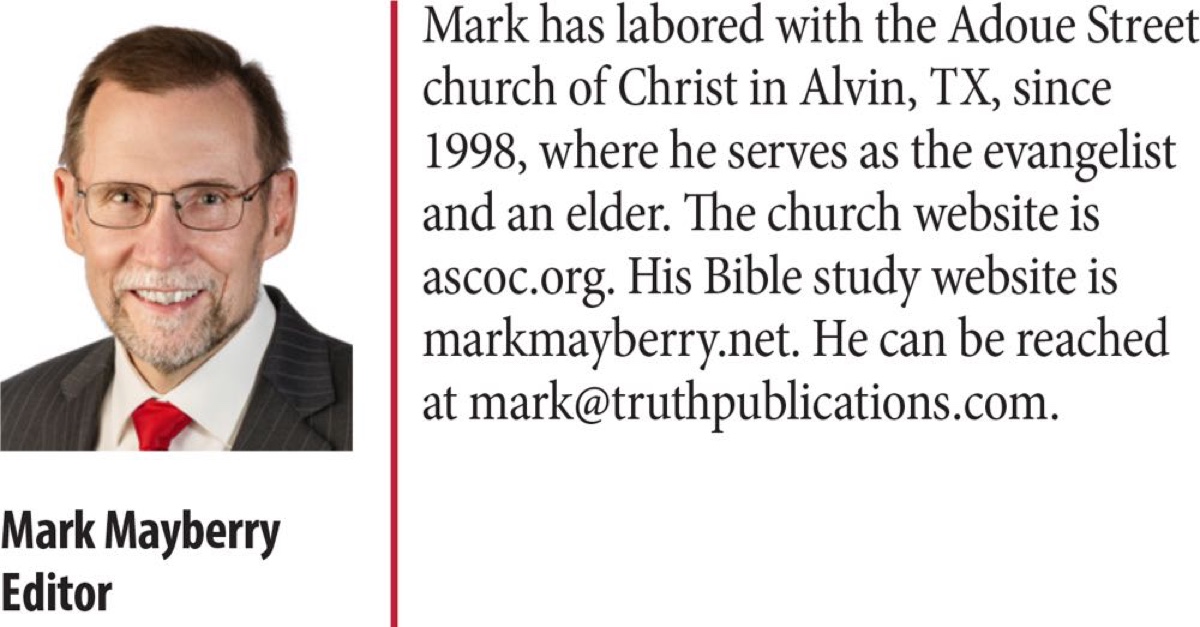By Mark Mayberry
Synopsis: Consider the danger of prideful ambition as we compare man’s willful rebellion in Genesis 11 to the humble obedience of New Testament Christians. Contrast the vertical focus observed at Babel with the horizontal focus of the apostolic church.
Genesis 11 records the story of man’s defiance and God’s dispersal of humanity. Following the flood, God commanded Noah and His descendants to repopulate the earth. They were to spread across its surface, subdue it, and to be a source of positive good in the world.
In contrast, the concept of centralization dominates man’s mindset. This was true in antiquity. Recall the centralized power of ancient Mid-eastern empires, like Egypt, Assyria, or Babylon. Consider the ever-expanding scope of our government (especially on the federal level), involving bureaucratic regulation, mandates, etc.
Religion is not exempt from such pressures. Centralization is often the handmaiden of apostasy. While the New Testament church operates under the leadership of its head, the Lord Jesus Christ, local congregations are autonomous. According to the biblical pattern, elders oversee the flock which is among them, i.e., the local church in which they are members (1 Pet. 5:1-2).
Let us recognize the danger of thinking that “bigger is better” is the only way to do something effective. Don’t accept the delusion that the biblical arrangement is too simple to be effective. Don’t be deceived into thinking that it needs the imposition of some centralized structure, organization or hierarchy. We cannot improve upon God’s plan.
When Noah and his family left the ark, they began life anew in a world that had been cleansed of the defilement of the antediluvian world. God commanded them, “Be fruitful and multiply and fill the earth.” Granting man dominion over nature, placing him in a position of stewardship over the lower creation, God desired that people scatter across the face of the globe.
Yet, in Genesis 11, we observe man’s unwillingness to carry out God’s command.
Now the whole earth used the same language and the same words. It came about as they journeyed east, that they found a plain in the land of Shinar and settled there. They said to one another, “Come, let us make bricks and burn them thoroughly.” And they used brick for stone, and they used tar for mortar. They said, “Come, let us build for ourselves a city, and a tower whose top will reach into heaven, and let us make for ourselves a name, otherwise we will be scattered abroad over the face of the whole earth” (Gen. 11:1-4).
Pride prevailed: “Come. . . let us make for ourselves a name” (v. 4). By pursuing their own path, they evidenced a spirit of self-will. Acting in defiance of God’s purpose, they sought to establish a highly centralized society.
Screensavers often display on our televisions and computer monitors. Arial views of mountains and deserts are breathtakingly beautiful. Sometimes the imagery comes from drones as they slowly fly over great cities like Dubai, Hong Kong, London and New York. It is amazing to see parks, buildings, skyscrapers, highways, airports, and railroads all filling such a compact space. Human ingenuity is displayed in ancient and modern cities.
In Genesis 11, men wanted to make a name for themselves. They attempted to build a civilization that was centralized and enduring. They aimed high: their tower would reach into the heavens. Yet, God disapproved of these grand schemes because they stood in opposition to His will. His goal of dispersal was accomplished by confusing the language. Their grand project was abandoned because they could no longer communicate effectively. The Lord thwarted their purposes, prevailed over their defiance, and scattered them over the face of the earth.
Humanity is often seduced by the siren’s call of centralization. Bigger is better. We want to build something that is glorious and great. We want our handiwork to endure. This is seen in the cities that men construct, and the cathedrals they erect.
The Dome in Cologne, Germany, is an enormous structure. According to Wikipedia, the cathedral is the tallest twin-spired church in the world (rising to 515 ft.), the second tallest church in Europe, and the third tallest church of any kind in the world. It is the largest Gothic church in northern Europe. Construction began in 1248, was halted around 1560, restarted in 1814, and completed in 1880. During World War II, the cathedral survived the Allied aerial bombings that leveled the city of Cologne.
When Sherelyn and I toured this amazing structure several years ago, we encountered an older fellow who stood looking up at the vast interior nave. “What a pile of rocks!” he exclaimed. In a sense, that’s right. The Cologne Cathedral was (theoretically) built to honor God. However polished, or perfect in symmetry, or seemingly permanent, it remains a pile of stones. It misses the mark of what God desires from His people—reflecting a physical rather than a spiritual concept of the church.
Men build magnificent structures, and erect vast, hierarchical organizations. However, this is not what Jesus Christ envisioned when establishing His church. He made it local, with a limited organizational structure. The cause of Christ flourishes when each member of the body does his part. The work of spreading the gospel is accomplished when individual Christians work and worship together in local congregations, and share the truth with family, friends, neighbors, and co-workers.
Men often dream of something bigger and better. God’s arrangement seems too dispersed, too inefficient, and too ineffective. “Let’s pool our resources!” “Let’s coordinate and consolidate our efforts!” All such schemes that set aside God’s simple pattern and substitute man’s (supposedly) superior wisdom inevitably lead to apostasy and are doomed to failure.
Roman Catholicism’s hierarchical arrangement is the oldest and most complex. Denominational synods, conferences and communions followed. Even those who express allegiance to restoring the ancient order have not been immune. Consider the American Christian Missionary Society of the 1850s and the Herald of Truth in the 1950s.
The Herald of Truth sought to combine the work of individual churches under the oversight of one congregation. During that era, reaching a national audience via radio and television was prohibitively expensive. While brethren tried to justify such consolidation as an expedient, this arrangement sacrificed congregational autonomy.
God established the most effective arrangement for accomplishing His eternal purpose. Jesus Christ died for our sins, arose from the grave, ascended to heaven, and is now seated at the right hand of the Father. The Holy Spirit was poured out on the day of Pentecost, empowering and inspiring the apostles to preach the gospel. When penitent believers obeyed Peter’s command, and were baptized for the remission of sins, they were added to the church.
With the passing of time, Christianity spread from the city of Jerusalem into the regions of Judea and Samaria, and ultimately, unto the remotest regions of the earth. It did not require centralization, or some elaborate hierarchal structure. The gospel spread through the efforts of individual Christians who established local congregations. This is where the work gets done.
For those who sought to build at Babel, their vertical focus was an expression of pride. They looked upward, not in seeking the will of God, but in defiance of it.
Men conceive and construct centralized arrangements because they think their methods are more effective than God’s simple pattern. However, such thinking is preening and prideful. Inevitably, centralized efforts do not bear the fruit promised by their founders.
In Genesis 11, the emphasis was upward (i.e., vertical) in the sense that reflected man’s preening pride. The horde of humanity assembled on the plains of Shinar said, “Look at what we’re going to build. Look at what we’re going to accomplish.” Yet, their efforts were doomed to failure because they defied God’s direction. How many times has man’s prideful ambition thus expressed itself?
In one sense, we should have a vertical focus. We should have our eyes fixed on heaven. However, that’s not what occurred in the land of Shinar. They weren’t seeking to exalt God by submitting to His will. Obsessed with their own glory, they acted in defiance of His clearly expressed commandment.
Turning our attention to the New Testament, consider the spread of the gospel message. After the church was established on the day of Pentecost, the cause of Christ grew exponentially. God’s simple plan worked! Do we think we can improve upon it?
When Jesus chose men through whom He would accomplish this work, where did He turn? Did He choose the best and the brightest of Roman schools of philosophy or the Jewish rabbinical schools? Of course, Saul of Tarsus had been educated at the feet of Gamaliel, but he was an outlier among the apostles. The rest were common folk: fishers and tax collectors and men from Galilee—a remote region not known for its education. The sophisticated elites in Jerusalem counted them as ignorant country bumpkins (Acts 2:7-8). Jesus chose ordinary people, simple men of faith, to further His will.
Look at Matthew and Mark’s account of the Great Commission:
And Jesus came up and spoke to them, saying, “All authority has been given to Me in heaven and on earth. Go therefore and make disciples of all the nations, baptizing them in the name of the Father and the Son and the Holy Spirit, teaching them to observe all that I commanded you; and lo, I am with you always, even to the end of the age” (Matt. 28:18-20).
And He said to them, “Go into all the world and preach the gospel to all creation. He who has believed and has been baptized shall be saved; but he who has disbelieved shall be condemned” (Mark 16:15-16).
For those who received the great commission, their horizontal focus was an expression of humility. They looked outward, in obedience to the will of God, seeking to share the gospel with lost humanity.
The Lord set forth a simple plan and a simple procedure: Go preach. Make disciples. The emphasis was not on creating centralized hierarchies or constructing grand cathedrals. It is not built around creating something flashy, faddish, or fun. Jesus did not advance God’s will by employing carnal methods.
The apostolic church grew from 3,000 to 5,000. Multitudes of men and women were being converted. Then persecution arose, and the Jerusalem church was scattered. From man’s perspective, the cause of Christ appeared doomed; its death knell had been rung. Yet, in reality, this was just the beginning.
The seed now is scattered to the four winds. Through a seeming setback, God’s plan and purpose are now realized. The truth of the gospel spread throughout the world, in the same way as humanity (following the flood) was dispersed to the uttermost part of the earth.
On the plains of Shinar, men dreamed of recognition: “Let us establish the world’s greatest city, construct the world’s highest tower, and be remembered for humanity’s greatest accomplishment!” However, this was not God’s purpose. He wanted humanity to scatter. Instead of dwelling in a highly centralized, hierarchal society, men would struggle in remote regions, living in isolation, often dwelling at great distances from one another.
What about the church today? The church today is composed of a multitude of individual congregations scattered around the world. In comparison with human denominations, the Lord’s church is often small. Why? Because the truth doesn’t have as wide an appeal as does error. Many walk the broad way that leads to destruction. Few walk the straight and narrow path that leads us upward toward God.
The faithful are a small minority. Consider the words of encouragement God shared with Elijah: “Yet I will leave 7,000 in Israel, all the knees that have not bowed to Baal and every mouth that has not kissed him” (1 Kings 19:18). While this number seems impressive, Israel’s population likely numbered in the millions; most had fallen into apostasy. In any age, those who remain faithful to God will be relatively few, and often discounted by the broader culture that emphasizes numbers, power, and wealth.
While the scope is universal, progress is incremental. The work of preaching the gospel is decentralized, accomplished by a host of individuals who fulfill the mandate Paul delivered to Timothy:
The things which you have heard from me in the presence of many witnesses, entrust these to faithful men who will be able to teach others also (2 Tim. 2:2).
When faithful Christians share the gospel with others, when that truth sinks into good and honest hearts, when it changes lives and cultivates character, God’s will is accomplished. This process plays out individually: one person teaching one person. The world may never notice. Churches of men (with their grand cathedrals and centralized hierarchies) may be completely oblivious to what’s going on, but God’s purposes are being realized through that simple procedure of faithful individuals teaching faithful individuals.



